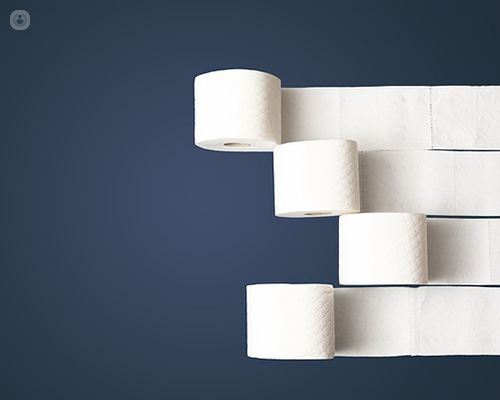Your guide: Healthy bowel habits and prevention of most common benign proctology diseases
Escrito por:In this detailed article, revered consultant general surgeon Ms Cinzia Sammartino shares expert insight on maintaining healthy bowel habits and gives key lifestyle advice to help prevent common proctology problems, such as haemorrhoids. The leading specialist also sheds light on the symptoms of haemorrhoids and the importance of eating a fibre-rich diet.

How can I maintain regular and healthy bowel habits?
The key to having healthy bowel habits and to prevention of the most common benign proctological disease, is multifactorial.
- Stay hydrated: Drink plenty of water throughout the day (about 8 glasses or more) to keep stools soft and easy to pass.
- Eat a fibre-rich diet and limit processed food (more in the next paragraph)
- Exercise regularly: Physical activity helps stimulate your digestive system and keeps things moving smoothly.
- Don't ignore the urge: When you feel the need to have a bowel movement, don't postpone it. Delaying can lead to constipation.
- Probiotics for gut health: Consider consuming foods or supplements that contain probiotics to maintain a healthy gut flora. You can add probiotic-rich foods to your diet, such as yogurt, kefir, sauerkraut, and kimchi. You can also take probiotic supplements to add to your diet. There are many brands in the market with different strain of bacteria and you can choose the one that more fits your needs.
- Bowel habits and bathroom training: see more in the next paragraph
What foods should I include in my diet to prevent haemorrhoids?
Eat a fibre-rich diet
Incorporate high-fibre foods such as fruits, vegetables, whole grains, and legumes into your daily meals. The recommended daily dose of fibre varies between 25 and 30 gr per day depending on gender and age. However, it is estimated that the average daily intake of fibre in most adult diets is only around 18 gr a day.
Tips to help increase the daily intake of fibre: switch to high-fibre breakfast cereal, wholegrain or granary bread or pasta, eat potatoes with the skin, add pulses, vegetables, fruits to your meals.
To give you an idea of the fibre content of some typical meals, here are two examples:
- Fibre at breakfast: Two thick slices of wholemeal toasted bread (6.6g of fibre) topped with one sliced banana (1.4g) and a small glass (150ml) of fruit juice (1.2g) will give you around 9.2g of fibre.
- Fibre at lunch: A baked jacket potato with the skin on (4.7g) with around half a can (about a 200g portion) of reduced-sugar and reduced-salt baked beans in tomato sauce (9.8g) followed by an apple (1.2g) will give you around 15.7g of fibre.
Limit processed food
Minimise your intake of processed and fast foods, as they can be low in fibre and high in unhealthy fats. Integrate diet with supplements rich in fibre.
Are there any specific exercises or habits to promote good digestive health and prevent haemorrhoids?
Manage stress
Chronic stress can affect your digestive system. Practice relaxation techniques like meditation or yoga.
Bathroom habits
Use proper posture on the toilet; a small stool or stack of books under your feet can help. Don't strain excessively. Keep your back straight, lean forward and rest your forearms on your knees. Have knees higher than hips by lifting heels or using a footstool keep your legs apart.
Bowel training
Try to train yourself to have a bowel movement at the same time each day to help you become more regular. For example, trying to have a bowel movement 15 to 45 minutes after breakfast may help, because eating helps your colon move stools.
What are the common symptoms of haemorrhoids?
Symptoms of haemorrhoid disease can be a common presentation of other anal or digestive pathologies. For this reason, it is important to see a proctologist and have an examination. Examination consists of inspection followed by insertion of a plastic tube called proctoscope. This should be the first step and gold standard in all patients experiencing one of more of the below symptoms.
- Blood in stools: normally small amount on the toilet paper or on the bowl. Rarely bleeding can be important to the point that requires emergency admission and blood transfusions.
- Itching or irritation in the anal area
- Discomfort, pain, or soreness in the anal region
- Lumps protruding from the anal region: a prolapsing lump can be protruding all the time or during and after motions. Sometimes prolapsing lumps can be manually reduced.
- Swelling in the anal region
- Faeces may leak out unintentionally (faecal incontinence)
Are there lifestyle changes that can help prevent haemorrhoids?
Manage constipation with diet, hydration, and healthy bowel habits. It can be useful to add sachets or tablets to help against the constipation. These medications are called laxatives.
Irritable bowel syndrome is a trigger for haemorrhoid flares up and knowing your gut and what triggers irritable bowel syndrome can be a big step on preventing haemorrhoids and living a more fulfilling life. Additionally, controlling your weight and losing weight if you are overweight or obese can help to prevent haemorrhoids.
If you require treatment for haemorrhoids and wish to schedule a consultation with Ms Sammartino, visit her Top Doctors profile today.


